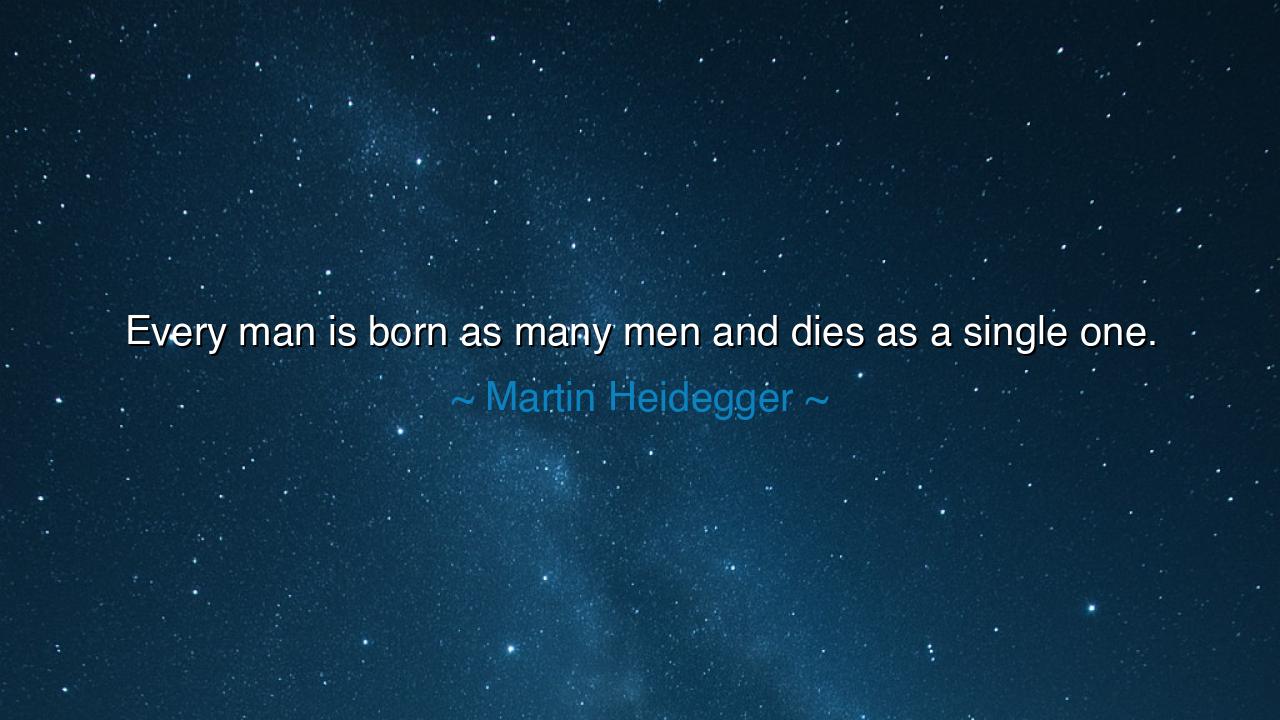
Every man is born as many men and dies as a single one.






“Every man is born as many men and dies as a single one.”
Thus spoke Martin Heidegger, the philosopher who gazed into the depths of being and wrestled with the mystery of existence. His words carry the weight of the ages — a truth both haunting and liberating. When he says that every man is born as many men, he speaks of the infinite possibilities that lie within the newborn soul. At birth, the spirit is boundless, untamed, filled with potential. Each child is a thousand paths waiting to be walked, a thousand selves waiting to be chosen. Yet as life unfolds, choices are made, doors close, and the self takes form. And by the time we reach the end, all those possibilities have converged into one — the single being we have become.
To be born as many men is to begin life as a multitude of dreams. The child could become a poet, a warrior, a healer, a wanderer — each possibility gleaming like a star in the sky of the soul. But life, with its demands and decisions, asks of us to choose, again and again. Each choice shapes us, carves us, limits us. To live is to define oneself; to become something is to relinquish all that one might have been. By the end, we stand as one person — not the sum of all possibilities, but the fruit of those we dared to pursue. Thus, Heidegger reminds us of both the tragedy and the glory of becoming: we are born infinite, but we must die defined.
This truth echoes through the ancient teachings. The Greek philosopher Heraclitus taught that “character is destiny,” meaning that who we choose to be determines the course of our fate. The Romans too, in their wisdom, believed that the greatest act of life is to forge oneself. For the self is not given — it is crafted through courage, action, and reflection. Heidegger’s words, though modern, are an echo of that same timeless call: each soul must journey from the formless sea of potential toward the solid land of being.
Consider the life of Leonardo da Vinci, that man of endless curiosity — painter, inventor, scientist, dreamer. In him, the many men of youth never entirely died; he carried their diversity until the end. Yet even he, at the close of life, was one — the Leonardo who had woven all his scattered selves into a single thread of genius and devotion. His death was not the extinction of possibility, but its completion — the uniting of all fragments into one enduring whole. He lived what Heidegger described: born as many, but dying as one — the one he chose to become.
But there is also a sorrow within this truth. For every self we become, countless selves remain unlived. The poet we might have been, the friend we might have cherished, the path we did not take — these shadows walk beside us silently. Yet this is the price of being human: we cannot live all lives, only our own. To die as a single one is to accept our final shape, to embrace the totality of who we are without regret for the paths left behind. The wise learn not to mourn their unlived lives, but to fill the one they live with truth, beauty, and courage.
Thus, Heidegger’s insight is not one of despair, but of awakening. It calls us to live consciously, to choose deliberately who we are becoming. Each action is a stroke upon the canvas of the soul; each moment is a thread in the tapestry of the self. To drift through life without awareness is to let others choose our form for us. But to live with intention is to sculpt ourselves into something worthy — to ensure that when we die as “a single one,” that one is noble, authentic, and alive with meaning.
The lesson of this saying, then, is this: guard your choices, for they are the steps by which your infinite selves narrow into one. Ask yourself often, “Who am I becoming?” Do not fear the loss of possibilities; fear only the loss of purpose. Live in such a way that when the end arrives — when the many selves of youth have faded into the one self of truth — you can look upon that person with peace.
For in the end, the greatness of life lies not in remaining infinite, but in becoming whole. Every man is born as many, yes — but the measure of his life is how well he forges those many into one. Choose your one self with courage, shape it with wisdom, and fill it with love. Then, when death comes, you will not mourn the selves that never were — for you will have become, at last, the fullest and truest version of the one you were meant to be.






AAdministratorAdministrator
Welcome, honored guests. Please leave a comment, we will respond soon